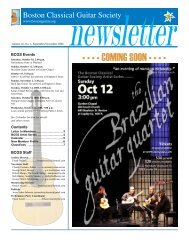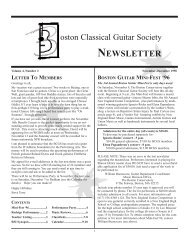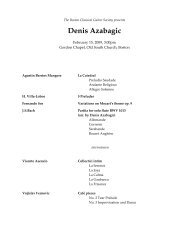2003 Jun-Aug - Boston Classical Guitar Society
2003 Jun-Aug - Boston Classical Guitar Society
2003 Jun-Aug - Boston Classical Guitar Society
You also want an ePaper? Increase the reach of your titles
YUMPU automatically turns print PDFs into web optimized ePapers that Google loves.
<strong>Jun</strong>e/<strong>Aug</strong>ust <strong>2003</strong> BCGS Newsletter Volume 10, Number 4<br />
“The Generous Musician”<br />
Eliot Fisk Interview, April 24, <strong>2003</strong><br />
by Evan Marcus<br />
Q: At what point did you decide to make a career out of the<br />
guitar?<br />
Eliot Fisk: I didn’t decide to make a career out of the guitar. I<br />
think it kind of decided itself. I guess I got to a certain point in<br />
my life where I just basically couldn’t live without music, and<br />
the guitar was my instrument. So one thing kind of led to another.<br />
I was really sort of groping about in an almost blind sort of<br />
fashion. I started playing the guitar when I was seven because<br />
my only brother has Down’s Syndrome and my mother had<br />
thought we, as a family, could sing songs with him to the<br />
accompaniment of a guitar. When after 3 months of teaching<br />
myself from a very primitive folk guitar method consisting of a<br />
book and some demo LPs, my parents offered me lessons. A<br />
member of our Quaker meeting in Philadelphia was the first<br />
double bass player in the Philadelphia Orchestra. He said I<br />
should study classical guitar because from that point of departure<br />
I’d be able to do any other style (of course this is not true,<br />
but it convinced us all). Peter Colonna, a former member of<br />
Segovia’s Siena class was duly located, and he became my first<br />
guitar teacher. Still I never practiced at all until I was around<br />
eleven.<br />
Q: What changed for you at age eleven?<br />
Eliot Fisk:<br />
Well, when I was that age my parents went to Sweden for one<br />
year. My father was a college professor and he had an exchange<br />
sabbatical year with a Swedish colleague of his, so I went to<br />
elementary school in Lund in the south of Sweden. I didn’t<br />
speak any Swedish at the start of the year. Naturally that<br />
entailed a certain amount of loneliness. Swedish TV was<br />
absolutely atrocious as far as I was concerned. Many hours of<br />
the day were without any programming whatsoever and when<br />
there was broadcasting it was, of course, in Swedish and so I<br />
still couldn’t really follow it. Anyway, when I was growing up<br />
my mother refused to have a TV in the house so I didn’t really<br />
miss TV too much anyway. So, being so out of my element, I<br />
started to practice. I got very interested in the guitar that year.<br />
For the first time I grew nails. When we came back from<br />
Sweden a year later, I was fluent in Swedish and I had also<br />
improved on the guitar.<br />
Q: When you came back to the U.S., did you find a guitar<br />
teacher?<br />
Eliot Fisk: The only serious guitar teacher I ever had in my life<br />
on a regular basis was William Viola of Philadelphia, with<br />
whom I started to work at that time. He was not a professional<br />
guitarist at all. He was<br />
an engineer at IBM.<br />
He was a very smart<br />
man. He only taught<br />
guitar on weekends<br />
but he was a profound<br />
influence on my later<br />
development.<br />
Q: That seems like a<br />
very unorthodox<br />
approach to learning a<br />
classical instrument.<br />
Eliot Fisk: But you<br />
can’t imagine what the<br />
guitar was like back<br />
then. Basically there<br />
was just Segovia, who<br />
was this huge phenomenon<br />
of practically religious proportions. Virgil Thompson<br />
has it right when he wrote, “There is no guitar but the Spanish<br />
guitar and Andres Segovia is its prophet.” Bream and Williams<br />
were just starting out. Bream was sort of like forbidden fruit<br />
and Williams was setting new standards for excellence in his<br />
own way. But we basically had so little real musicological or<br />
even technical information about the guitar. We just had<br />
Segovia’s records. I listened to those recordings millions of<br />
times and tried to imitate what I heard. My teacher did the<br />
same, taking many changes off the records and teaching me to<br />
do the same. Bill Viola was very demanding. He insisted on<br />
absolute clarity, on reliable editions (meaning mostly Segovia’s)<br />
and he also insisted that I maintain a big repertoire. He had me<br />
make a list of all my pieces and at the end of each lesson he<br />
would go down the entire list making a check at random in<br />
front of five pieces which I was to play at the next lesson a<br />
week later. The pieces were typically challenging: many studies<br />
of Sor, Villa-Lobos, Turina, Moreno Torroba, Ponce,<br />
Castelnuovo-Tedesco, Sor’s Mozart Variations, Bach’s Suite<br />
BWV 996 (this in Bream’s edition) also the Prelude, Fugue and<br />
Allegro, BWV 998. All of these I was playing as best I could<br />
by the time my family moved away from Philadelphia when I<br />
was 14. Nowadays this would be no big deal, but back then it<br />
was kind of unusual. Again, you can’t imagine how little we<br />
knew.<br />
Q: Did you continue to study this way throughout high school?<br />
Eliot Fisk: Yes all the way through high school I had this sort<br />
of double life. I went to a normal American high school and did<br />
all the normal school subjects. I never did any music courses<br />
although we were lucky to have a wonderful chorus director<br />
and a wonderful band director, both of whom are still in the<br />
Syracuse area doing great things. But at the time I never really<br />
participated in the official school run musical activities.<br />
4
















